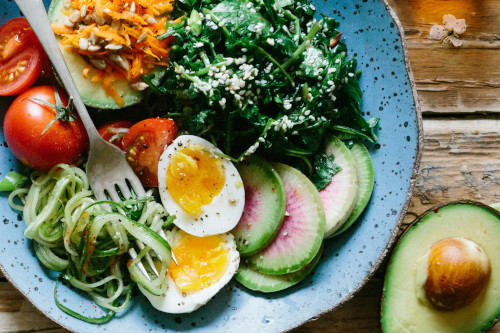The biggest and best things for mental health are to eat food and drink water. Whether it is the client who misses breakfast because she is always rushing to work, or the client missing out on parts of her lunch because she is following some kind of diet rules, if you are not eating regularly and enough your mental wellbeing can struggle. This is because your blood sugars are likely to be unstable (leading to increased anxiety & low mood amongst other things), you are more likely to be missing important mental health nutrients, and more likely to be low in energy. It is hard to feel calm and content if you feel like you are wading through mud, can’t concentrate or experiencing the physical feelings of anxiety. Equally, staying hydrated is important for keeping anxiety and low mood at bay as well as supporting memory and concentration. It is important to not over-hydrate, so keep listening to your body, but drinking water little and often can be a helpful tip. If you enjoy drinking juice, hot or fizzy drinks, this is all fine as long as you are not replacing water (including herbal teas and flavoured water) with these more “fun drinks”.
As all my clients know – I am always talking about the benefits and beauty of fats. Fats come in many forms, but saturated fats (from full-fat dairy, the fat and skin on meat & fish, coconut products) and phosphatidylserine & phosphatidylcholine (found in eggs, whole milk and liver) are just as important as omega fatty acids (oily fish, avocado and seeds). They all do different things to support brain health and the nervous system, but it is really unhelpful to restrict fats or to prioritize certain fats over others.
The nervous system utilises a lot of minerals from magnesium to potassium to selenium to zinc. While it is important to never take a supplement without professional support, eating a mineral-rich diet can be really helpful. Many minerals are found in greens and other vegetables, but vegetables are not the only mineral-rich foods. Full fat dairy, eggs, nuts (including peanut butters), chocolate, offal and fish also have ample minerals in them.
A happy, calm digestive system plays a key role in mental wellbeing. Nerve endings “hold hands” with the gut. Long term constipation and or diarrhoea can play a role in mood issues. Restricting, binging and delaying your food is confusing for the digestion and almost all clients with disordered eating have some kind of digestive issue. The digestive system likes regular food in adequate portions. If you are feeling your digestion needs a bit of support, ensure you are eating enough regularly throughout the day, drinking enough water and eating enough fruits, vegetables, whole grains and nuts. However, eating enough fats is also vital. Long term low-fat eating more often than not results in constipation. I am always encouraging clients to be liberal with the salad dressings & sauces, butter and oil in the pan as well as nut butters, dairy and the fat on meats. Only restrict these if there is a clear medical reason to do so. Finally, if you feel your digestion is problematic, it is always a good idea to see the GP.
Beyond macro & micro nutrients; balance, moderation, fun and flexibility are just as important. I often say to my clients that “pleasure is the missing nutrient”. We need pleasure from our food (not all the time, but enough of the time). Denial, restriction and unhelpful rules are always detrimental as they prevent you getting the nutrition you need for true mental health, increase anxiety, self-criticism and a feeling of failure. They are also socially awkward and distressing (even if they have moments of feeling like they are good or a success). It is important to recognize that bodies are robust (apart from in some very exceptional circumstances) and are not only able to tolerate fun-foods but do well when they are included sometimes a lot and sometimes some of the time. Feeling calm to take time out of your day to enjoy a slice of cake, adding crisps to your lunch or having ice cream and chocolate sauce for your dessert, plays a nice role nutritionally, socially and emotionally.






.jpg)





